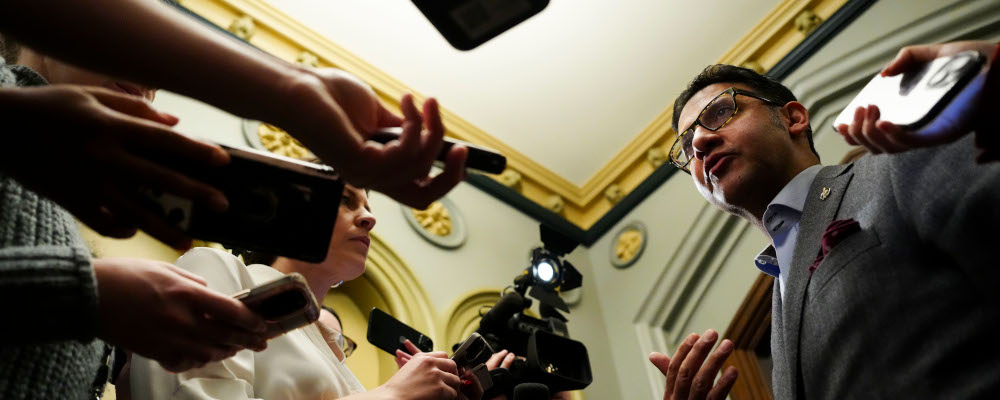Bill C-63, the federal government’s so-called Online Harms Act, continues to be the subject of vigorous debate across the political and legal spectrum. Numerous civil liberty organizations and legal scholars have expressed alarm over what they describe as the bill’s draconian restrictions on expression that will discourage legitimate political speech. Critics contend that the law places unjustifiable limits on freedom of expression, which is constitutionally guaranteed by section 2(b) of the Canadian Charter of Rights and Freedoms.
One of Bill C-63’s most problematic provisions would allow for the issuing of peace bonds (referred to in the Criminal Code as “recognizances”) against hate crime offences. When there are “reasonable grounds” to fear that someone is likely to commit such an offence, provincial court judges would be empowered to, among other things, place the offender under house arrest, or order that they refrain from communicating with certain people.
Officials with the Department of Justice and spokespeople for the federal government have downplayed the risks to free expression posed by these peace bond provisions. In one op-ed, a senior advisor with the Prime Minister’s Office dismissed criticism of these provisions, framing it as “right-wing” fear-mongering to convince Canadians that “peace bonds are a novel concept created by the Liberal government to appease the woke overlords while punishing regular Canadians with pre-crime offences, like thinking the wrong thing.”

These defenders of Bill C-63 contend that peace bonds against hate crime offences are justified because the Criminal Code already allows for similar peace bonds against terrorist offences, as well as sexual offences and offences involving serious personal injury. It’s a seemingly witty retort. After all, the Harper Government lowered the threshold to obtain a peace bond when it is feared that someone is likely to commit a terrorist offence. Doesn’t this expose the Conservatives as political hypocrites for now opposing similar legal tools in the Online Harms Act?
On closer examination, this argument fails to withstand scrutiny. Simply put, the existing legal justification for issuing peace bonds against terrorist and other offences is actually much stronger than for hate crime offences—even though civil libertarians may credibly oppose both.
Establishing “reasonable grounds” that someone is likely to commit a terrorist offence or an offence involving serious personal injury is a largely objective analysis. For example, if someone has been gathering materials that could be used to assemble a bomb, and has been posting threatening messages online against a particular group or venue, it may be reasonable to conclude they intend to commit a terrorist offence in the near future.
Notably, the Criminal Code prohibits not just terrorist acts, but also “conspirac[ies], attempt[s] or threat[s] to commit any such act or omission.” Thus, actively planning to commit a terrorist offence is itself a criminal act that our law already prohibits. In these cases, a judge issuing a peace bond will consider actions that may themselves prove to be criminal, even if law enforcement still needs to gather additional evidence before charges can be laid. In this regard, peace bonds against terrorist offences are broadly consistent with existing prohibitions on conspiracies or attempts to commit these kinds of offences.
However, these same justifications can’t be given for the Trudeau government’s proposed peace bonds against hate crime offences. Merely intending to say or do something hateful does not, on its own, constitute a criminal act. Moreover, as I recently wrote for these pages, “The evidence that judges will consider when deciding whether to issue the peace bonds envisioned by Bill C-63 will, invariably, include the allegedly hateful content that the individual in question is expected to express.” In other words, assessing the likelihood that someone will commit a hate crime offence demands (contrary to what certain PMO advisors would suggest) an investigation into that person’s very thoughts.
How else can a judge assess what someone will say before they say it? Where no actual expression has taken place, all that’s left is what it’s believed that person intends to say. This sort of assessment would necessarily require an investigation into the “internal forum” of someone’s thoughts. This raises the deeply troubling prospect that Bill C-63 not only imposes limits on freedom of expression but also on one of the forgotten freedoms also guaranteed by section 2(b) of the Charter: freedom of thought.
Indeed, legal scholars like Brian Bird have suggested that limits on freedom of thought may never be constitutionally justified. Although conventional wisdom holds that no right or freedom is absolute, this is not what the Charter actually says; rather, section 1 states that limits may only be imposed on Charter rights and freedoms where they can be “demonstrably justified in a free and democratic society.” Against this rigorous standard, the question must be asked: under what circumstances could restrictions on a person’s very thoughts—before those thoughts have even been expressed—be justified in a society that purports to be free and democratic?
The Trudeau Government has yet to offer a compelling answer to this unsettling question.




